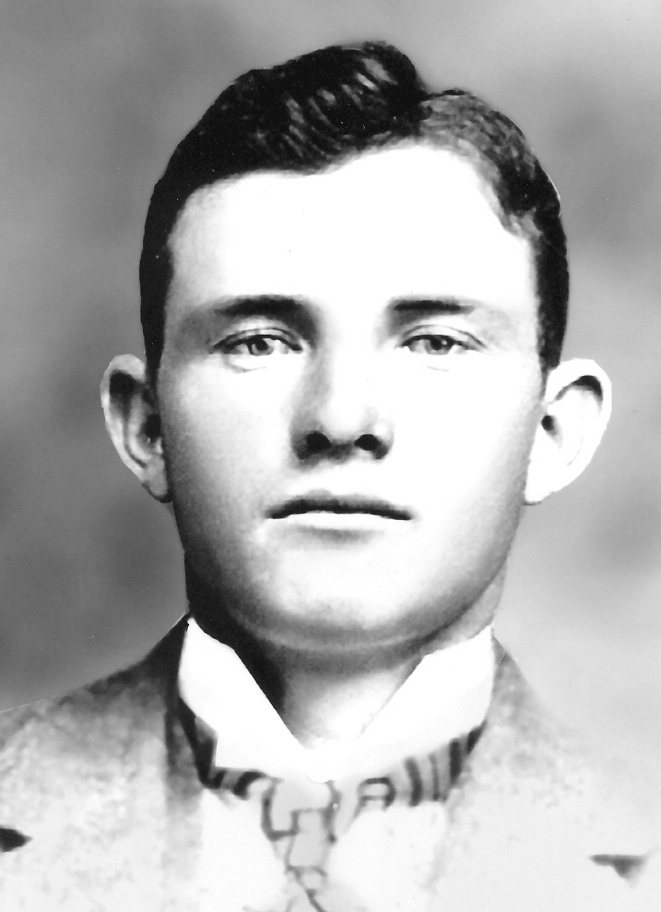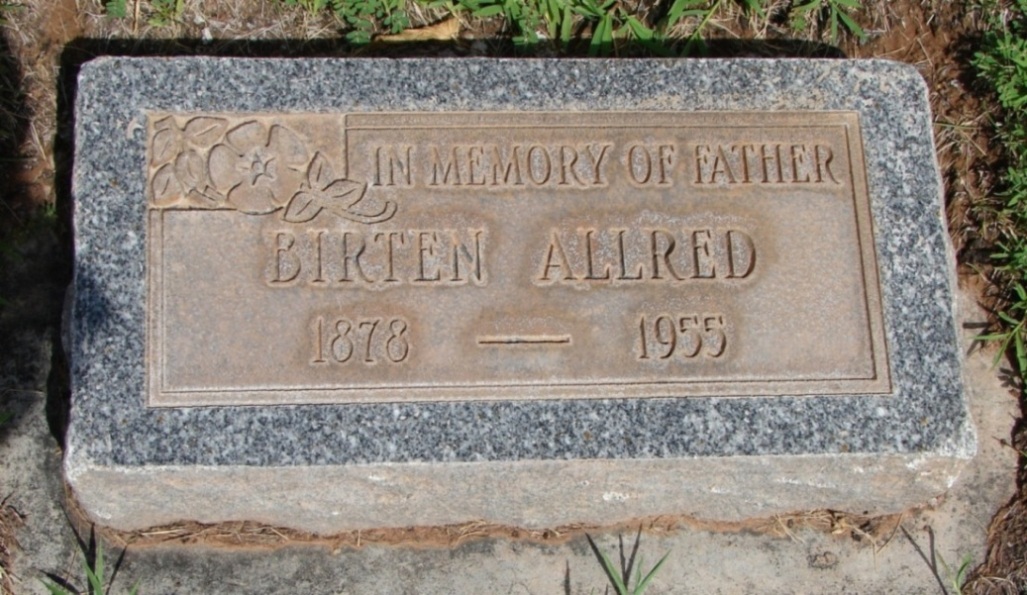When he and his older brother, Wilson, were teenagers they left Spring City and went to Moab in southeastern Utah. They worked on ranches. They married two Johnson sisters. Wilson married Laura Johnson. Birt and Sara Anna Johnson were married October 9, 1900, in the Salt Lake City LDS Temple. He left the next day for an LDS mission to the Northern States.
The Allred brothers were awarded the mail contract from Thompson Springs on the Denver and Rio Grande Railway to Moab, 32 miles away.
Initially the Allred brothers carried the mail, passengers and freight using horses and wagons. In 1912 they purchased two Rambler automobiles to do the transportation. Eventually the Allred Transportation Company line was extended south to Monticello, Utah.
Birt Allred was a member of the board of trustees of the town of Moab. The September 6, 1912, issue of the Grand Valley Times reported that Birten Allred was a candidate for a four-year term as Grand County Commissioner.
The October 25 issue, in an article paid by the Democratic County Coalition said: "Some time before the convention the Democrats decided that there should be at least one young man on the board. No one else was so well fitted by temperament and training for the position.
"Mr. Allred believes that each part of the county is entitled to its proportionate share of road improvements and if elected will put his views into effect.
"He believed that Moab should have a public library. Consequently when the matter came before the board of town trustees of which he is a member he voted for it. When, on Election Day, it was feared that the library proposition would not carry he stopped his work and spent the whole day in taking voters to the polls to cast their votes for the library." He had approximately a third grade education, but he saw the need for a public library in this small town.
The November 8, 1912, issue of the Grand Valley Times, reported that he won the election by 41 votes.
Birt also ranched in the Moab area. He had both sheep and cattle. Their summer range was the La Sal Mountains and their winter range was in some of the areas that is now Canyonlands National Park. His sons assisted their father in the ranching endeavors.
In addition to his ranching activities, he also raised crops. He won several prizes at the Utah State Fair for both corn and grapes.
For 16 years, the family lived near Moab on what was known as the Huff Ranch. In 1927, Birt mortgaged the ranch and bought the South Mesa ranch in the La Sal Mountains.
When the stock market fell in 1929, Birt lost the Huff Ranch, the South Mesa Ranch and his herd of sheep. They moved from a nine-room home at the ranch to a two-room home with an attic in Moab. Six children were still at home. The bank offered him $40 a month to herd the sheep he had once owned. Times were difficult for Birt and his family. However, during the House of Representatives for the 1935-1936 term. The pay was $4 per day during the session. Because of the distance from Moab, he had to pay to live in Salt Lake City. He could not afford to continue in the legislature and he only served the 1935 portion of the term.
Also during the Great Depression, he served in the Civilian Conservation Corps. Two of his sons were supervisors of some of these CCC Camps. His son, J. Pratt Allred, supervised a camp in the Moab area and his son, Berten Wendell "Bill" Allred, supervised camps in western Colorado.
He and Anna Johnson were the parents of 13 children. Ten children lived to adulthood. Anna died in Salt Lake City May 5, 1948. Birt died November 1, 1955, in Orem, Utah.
Written by his daughter, Frieda Allred Hirst, and his granddaughter, Alice Allred Pottmyer
When he and his older brother, Wilson, were teenagers they left Spring City and went to Moab in southeastern Utah. They worked on ranches. They married two Johnson sisters. Wilson married Laura Johnson. Birt and Sara Anna Johnson were married October 9, 1900, in the Salt Lake City LDS Temple. He left the next day for an LDS mission to the Northern States.
The Allred brothers were awarded the mail contract from Thompson Springs on the Denver and Rio Grande Railway to Moab, 32 miles away.
Initially the Allred brothers carried the mail, passengers and freight using horses and wagons. In 1912 they purchased two Rambler automobiles to do the transportation. Eventually the Allred Transportation Company line was extended south to Monticello, Utah.
Birt Allred was a member of the board of trustees of the town of Moab. The September 6, 1912, issue of the Grand Valley Times reported that Birten Allred was a candidate for a four-year term as Grand County Commissioner.
The October 25 issue, in an article paid by the Democratic County Coalition said: "Some time before the convention the Democrats decided that there should be at least one young man on the board. No one else was so well fitted by temperament and training for the position.
"Mr. Allred believes that each part of the county is entitled to its proportionate share of road improvements and if elected will put his views into effect.
"He believed that Moab should have a public library. Consequently when the matter came before the board of town trustees of which he is a member he voted for it. When, on Election Day, it was feared that the library proposition would not carry he stopped his work and spent the whole day in taking voters to the polls to cast their votes for the library." He had approximately a third grade education, but he saw the need for a public library in this small town.
The November 8, 1912, issue of the Grand Valley Times, reported that he won the election by 41 votes.
Birt also ranched in the Moab area. He had both sheep and cattle. Their summer range was the La Sal Mountains and their winter range was in some of the areas that is now Canyonlands National Park. His sons assisted their father in the ranching endeavors.
In addition to his ranching activities, he also raised crops. He won several prizes at the Utah State Fair for both corn and grapes.
For 16 years, the family lived near Moab on what was known as the Huff Ranch. In 1927, Birt mortgaged the ranch and bought the South Mesa ranch in the La Sal Mountains.
When the stock market fell in 1929, Birt lost the Huff Ranch, the South Mesa Ranch and his herd of sheep. They moved from a nine-room home at the ranch to a two-room home with an attic in Moab. Six children were still at home. The bank offered him $40 a month to herd the sheep he had once owned. Times were difficult for Birt and his family. However, during the House of Representatives for the 1935-1936 term. The pay was $4 per day during the session. Because of the distance from Moab, he had to pay to live in Salt Lake City. He could not afford to continue in the legislature and he only served the 1935 portion of the term.
Also during the Great Depression, he served in the Civilian Conservation Corps. Two of his sons were supervisors of some of these CCC Camps. His son, J. Pratt Allred, supervised a camp in the Moab area and his son, Berten Wendell "Bill" Allred, supervised camps in western Colorado.
He and Anna Johnson were the parents of 13 children. Ten children lived to adulthood. Anna died in Salt Lake City May 5, 1948. Birt died November 1, 1955, in Orem, Utah.
Written by his daughter, Frieda Allred Hirst, and his granddaughter, Alice Allred Pottmyer
Family Members
-
![]()
Berten Wendell "Bill" Allred
1904–1976
-
![]()
Fay Inez Allred Chadwick
1906–1997
-
![]()
Joseph Pratt Allred
1908–1991
-
![]()
Ruth Allred
1910–1910
-
![]()
Bertha Allred Oliver
1914–1969
-
![]()
Elna Ann Allred Hector
1916–1985
-
![]()
Josephine "Jo" Allred Prinster
1918–2009
-
![]()
Edith Allred
1920–1921
-
![]()
Frieda Isabelle Allred Hirst
1922–2012
-
![]()
Infant Allred
1924–1924
-
![]()
Claron Wilson Allred
1928–1990































